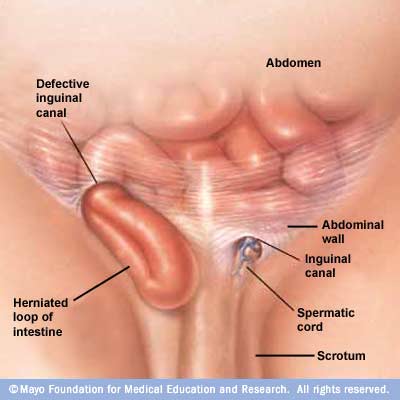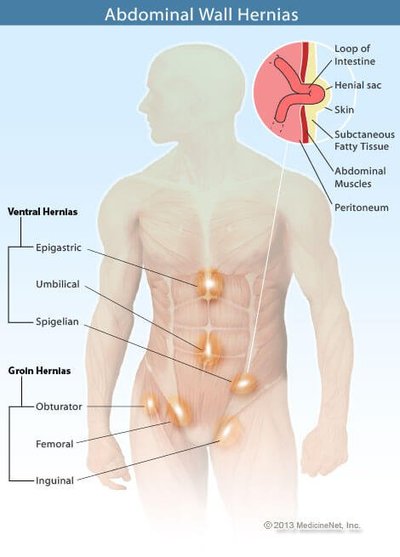|
A Hernia occurs when an internal part of the body (eg. intestines or other tissues) push through a weakness in the muscle or surrounding tissue wall. The abdominal wall is made up of layers of different muscles and tissues. Weak spots may develop in these layers that may allow contents of the abdominal cavity to protrude or herniate. Hernias are very common in the abdomen, but they can also appear in the chest, upper thigh and groin areas. Most of the time, hernias have no or very few symptoms. Some persons do not know that they have a hernia unless it shows up during a routine medical exam. The most common symptom of a hernia is a swelling or lump in the affected area. The lump can often be pushed back in (reduced) or it may disappear when you lie down. Coughing, standing or straining may make the lump appear more visible. Other common symptoms may include pain/ discomfort in the affected area. Weakness, pressure, or a feeling of heaviness could occur in the area as well. Most hernias are not immediately life threatening, but they may not go away on their own. Sometimes they can require surgery to prevent potentially dangerous complications. COMMON TYPES OF HERNIAS Inguinal Hernia Inguinal hernias are the most common type of hernia and are more common in men than women. These hernias occur when the intestines push through a weak spot or tear in the lower abdominal wall, often in the inguinal canal, (which is found in the groin). Men with huge inguinal hernias may notice a swelling that extends from the groin all the way down into the scrotum. (If a portion of tissue pushes through the wall of the femoral canal, it’s called a femoral hernia. A femoral hernia will appear as a bulge near the upper thigh or in the groin as well). See images below. Umbilical hernia An umbilical hernia occurs when part of the intestine or fatty tissue bulges through the muscle near the belly button (navel, umbilicus). Umbilical hernias can occur in children and babies under 6 months old. You may notice a bulge in or near your child’s bellybutton, especially when they are crying. Umbilical hernias in children typically go away on their own by the time the child is 1 or 2 years old. If it hasn’t gone away by around 4 years old then surgery may be used to correct it. Some other types of hernia that can affect the abdomen include: incisional hernias, epigastric hernias and spigelian hernias. See images below. Hiatal hernia A hiatal hernia occurs when part of your stomach protrudes up through the diaphragm into your chest cavity. The diaphragm separates the organs in your abdomen from those in your chest. This type of hernia may not have any noticeable symptoms, although it can cause heartburn in some persons. CAUSES Increased pressure in the abdomen may lead to weakening of a portion of the abdominal wall, either suddenly or gradually over time. Some risk factors for developing a hernia include:
TREATMENT The treatment for a hernia is usually surgery. A number of factors will be considered when deciding whether surgery is appropriate, these include: the type of hernia, the content of your hernia, your symptoms, and your general health. For some persons “watchful waiting” may be the best treatment. (This may be for persons with very small hernias, or persons with medical conditions that prevent them from having immediate surgery). For more information on hernia repair surgery, you can click the link below. https://www.facs.org/~/media/files/education/patient%20ed/adultumbilical.ashx Conversely, if left untreated, a hernia could grow extremely large and/or become very painful. A portion of the intestine could become trapped in the abdominal wall, and if it does not get enough blood flow, it could become infected or die. This is a life-threatening situation that requires immediate medical attention. The symptoms include sudden severe pain in the area, nausea/vomiting and constipation. You should go to the nearest hospital straightaway if you have a hernia and you develop the above symptoms. PREVENTION Tip#1: Avoid excessive weight lifting Excessive weight lifting increases the pressure in the abdomen, which can cause tissue or intestine to protrude through a weak point in the abdomen. This could create or enlarge a hernia. Tip#2: Quit smoking Smoking can cause coughing, which can put pressure on your abdomen, which increase the risk of getting or irritating a hernia. Tip#3: Maintain a healthy body weight When you are overweight or obese, your abdominal wall is constantly under pressure from the excess body fat. Carrying a lot of extra weight around the abdomen will stretch and weaken the abdominal wall and increase your risk of having a hernia. Tip#4: Avoid constipation Straining to pass stool increases abdominal pressure, which increases the chance of getting a hernia. Try to incorporate high-fiber foods into your diet, such as fruits, vegetables and whole grains. Keeping hydrated may also prevent constipation as well. I hope these tips on HERNIA were helpful; Remember YOUR HEALTH IS INVALUABLE. By Dr. J. Lawarna Matthew Acknowledgments British Hernia society American College of Surgeons Medicine, Net Inc. and Mayo Foundation for Images. Visit https://www.hernia.org/types/ and https://www.facs.org/~/media/files/education/patient%20ed/adultumbilical.ashx for more information
1 Comment
11/21/2020 04:23:12 am
Reply
Leave a Reply. |
AuthorDr. J. Lawarna Matthew Archives
January 2021
Categories |


 RSS Feed
RSS Feed
